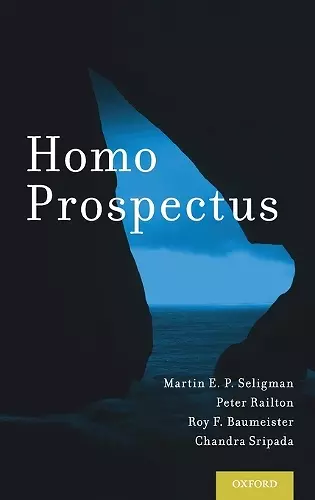Homo Prospectus
Roy F Baumeister author Martin E P Seligman author Peter Railton author Chandra Sripada author
Format:Hardback
Publisher:Oxford University Press Inc
Published:4th Aug '16
Currently unavailable, and unfortunately no date known when it will be back

Our species is misnamed. Though sapiens defines human beings as "wise" what humans do especially well is to prospect the future. We are homo prospectus. In this book, Martin E. P. Seligman, Peter Railton, Roy F. Baumeister, and Chandra Sripada argue it is anticipating and evaluating future possibilities for the guidance of thought and action that is the cornerstone of human success. Much of the history of psychology has been dominated by a framework in which people's behavior is driven by past history (memory) and present circumstances (perception and motivation). Homo Prospectus reassesses this idea, pushing focus to the future front and center and opening discussion of a new field of Psychology and Neuroscience. The authors delve into four modes in which prospection operates: the implicit mind, deliberate thought, mind-wandering, and collective (social) imagination. They then explore prospection's role in some of life's most enduring questions: Why do people think about the future? Do we have free will? What is the nature of intuition, and how might it function in ethics? How does emotion function in human psychology? Is there a common causal process in different psychopathologies? Does our creativity change with age? In this remarkable convergence of research in philosophy, statistics, decision theory, psychology, and neuroscience, Homo Prospectus shows how human prospection fundamentally reshapes our understanding of key cognitive processes, thereby improving individual and social functioning. It aims to galvanize interest in this new science from scholars in psychology, neuroscience, and philosophy, as well as an educated public curious about what makes humanity what it is.
An important insight about how the mind works, presented with a slew of fascinating discoveries and a refreshingly interdisciplinary approach. * Steven Pinker, Johnstone Family Professor of Psychology, and author of The Language Instinct and How the Mind Works *
Homo Prospectus is a groundbreaking book that capitalizes on 21st-century fMRI studies and user-friendly philosophy to create a paradigm shift that may make the book the most influential psychological text since Skinner's Science and Human Behavior. The concept of prospection developed in Homo Prospectus, of being drawn by the future, instead of-as both Freud and Skinner would have it-being driven by the past, reflects a true paradigm shift not only for academics and clinicians, but for the general reader. * George E. Vaillant, MD, Author of Triumphs of Experience *
One of the greatest satisfactions in the life of the mind is learning something that feels deeply true, even familiar, that we never actually thought before, when a book articulates intuitions that we never quite knew we had. Homo Prospectus does just this. . . . The authors are eminent philosophers and psychologists who write beautifully. The book convincingly demonstrates that fast intuitive thinking is in fact comprehensive, complex, and well-informed, and applies this insight to domains ranging from morality to successful aging. * Phoebe Ellsworth, PhD, Frank Murphy Distinguished University Professor of Psychology and Law, University of Michigan Law School *
One of the most interesting chapters in the book is on Creativity and Aging with guest appearances by Marie Forgeard and Scott Barry Kaufman...this chapter points to the evolutionary benefits of creativity throughout our lifespan, establishing economic security and driving innovation to create a better life for our offspring. The human race has advanced by our ability to hand down innovations from one generation to the next, based on our imagined prospection of their future needs. * Jeremy McCarthy, The Psychology of Wellbeing *
ISBN: 9780199374472
Dimensions: 239mm x 160mm x 36mm
Weight: 658g
400 pages